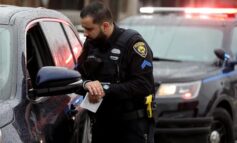Throughout our lives, it is usually acceptable to explain our actions with, “I didn’t mean to do it,” or “it was an accident,” or some other phrase, evidencing a “good heart.” Usually, people will forgive others who accidentally harm someone. However, that is not so with traffic offenses in Michigan and most other states. Traffic offenses are strict liability, meaning that intent is irrelevant to a court deciding if the accused broke the law. All that matters is if the defendant actually completed the prohibited act.
To illustrate this point, consider People v. Jones, a 1984 case from the Michigan Court of Appeals. On December 19, 1981, Jones, unable to halt his car at a stop sign in Kalamazoo Township, due to icy road conditions, struck another car passing through the intersection. He was subsequently ticketed and prosecuted for violating the Kalamazoo Township Ordinance, requiring drivers to stop at a stop sign.
Jones’s civil infraction case was dismissed by the district court after that court held that Jones had attempted to stop his car and therefore had not violated the traffic ordinance. The circuit court affirmed this judgment on August 6, 1982. The prosecution amazingly appealed that decision, arguing that guilty intent is not an element of the civil infraction.
The Court of Appeals agreed with the prosecution. The court’s opinion states:
“Courts in this country have almost universally held that traffic violations are strict liability offenses, in which the motorist’s negligence, or lack of intent to commit the infraction, is irrelevant. Two reasons underlie this conclusion: The purpose of the statute is to prevent the recurrence of the nuisance, not to punish. Although punishment must be prescribed in order to make the statute effective. Then it is neither essential, nor logical, to consider the intent of the maker of the nuisance.
“The accused, if he does not will the violation, usually is in a position to prevent it with no more care than society might reasonably expect and no more exertion than it might reasonably exact from one who assumed his responsibilities. Also, penalties commonly are relatively small and conviction does no grave damage to an offender’s reputation. Under such considerations, courts have turned to construing statutes and regulations that make no mention of intent, as dispensing with it, and holding that the guilty act alone makes out the crime.
“In this case, driving through a stop sign is a strict liability offense. For this reason, defendant’s inability to stop at the stop sign was irrelevant. The facts here do not present a situation in which there was no actus reus (e.g., a vehicle behind the motorist’s car failed to stop and pushed him past the stop sign into the intersection), or in which the motorist failed to stop, due to a mechanical failure previously unknown to him. Instead, defendant was aware of the icy road conditions at least five minutes before the accident and so could have prevented the violation by applying his brakes earlier.”
Thus, Jones shows us what strict liability means when it comes to traffic offenses. It does not matter that Jones tried to stop at the stop sign and hoped against hope that his car would stop. All that matters is that the sign was there and Jones failed to stop his car.
— Kassem Dakhlallah is a partner with Jaafar & Mahdi Law Group, P.C. His practice focuses on complex litigation including class actions, representative actions, commercial litigation, civil forfeiture and personal injury. He can be reached at 313. 846.6400 and kassem@jaafarandmahdi.com.
Throughout our lives, it is usually acceptable to explain our actions with, “I didn’t mean to do it,” or “it was an accident,” or some other phrase, evidencing a “good heart.” Usually, people will forgive others who accidentally harm someone. However, that is not so with traffic offenses in Michigan and most other states. Traffic offenses are strict liability, meaning that intent is irrelevant to a court deciding if the accused broke the law. All that matters is if the defendant actually completed the prohibited act.
To illustrate this point, consider People v. Jones, a 1984 case from the Michigan Court of Appeals. On December 19, 1981, Jones, unable to halt his car at a stop sign in Kalamazoo Township, due to icy road conditions, struck another car passing through the intersection. He was subsequently ticketed and prosecuted for violating the Kalamazoo Township Ordinance, requiring drivers to stop at a stop sign.
Jones’s civil infraction case was dismissed by the district court after that court held that Jones had attempted to stop his car and therefore had not violated the traffic ordinance. The circuit court affirmed this judgment on August 6, 1982. The prosecution amazingly appealed that decision, arguing that guilty intent is not an element of the civil infraction.
The Court of Appeals agreed with the prosecution. The court’s opinion states:
“Courts in this country have almost universally held that traffic violations are strict liability offenses, in which the motorist’s negligence, or lack of intent to commit the infraction, is irrelevant. Two reasons underlie this conclusion: The purpose of the statute is to prevent the recurrence of the nuisance, not to punish. Although punishment must be prescribed in order to make the statute effective. Then it is neither essential, nor logical, to consider the intent of the maker of the nuisance.
“The accused, if he does not will the violation, usually is in a position to prevent it with no more care than society might reasonably expect and no more exertion than it might reasonably exact from one who assumed his responsibilities. Also, penalties commonly are relatively small and conviction does no grave damage to an offender’s reputation. Under such considerations, courts have turned to construing statutes and regulations that make no mention of intent, as dispensing with it, and holding that the guilty act alone makes out the crime.
“In this case, driving through a stop sign is a strict liability offense. For this reason, defendant’s inability to stop at the stop sign was irrelevant. The facts here do not present a situation in which there was no actus reus (e.g., a vehicle behind the motorist’s car failed to stop and pushed him past the stop sign into the intersection), or in which the motorist failed to stop, due to a mechanical failure previously unknown to him. Instead, defendant was aware of the icy road conditions at least five minutes before the accident and so could have prevented the violation by applying his brakes earlier.”
Thus, Jones shows us what strict liability means when it comes to traffic offenses. It does not matter that Jones tried to stop at the stop sign and hoped against hope that his car would stop. All that matters is that the sign was there and Jones failed to stop his car.
— Kassem Dakhlallah is a partner with Jaafar & Mahdi Law Group, P.C. His practice focuses on complex litigation including class actions, representative actions, commercial litigation, civil forfeiture and personal injury. He can be reached at 313. 846.6400 and kassem@jaafarandmahdi.com.





Leave a Reply